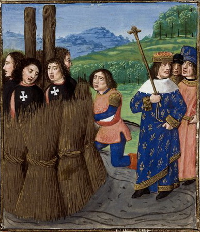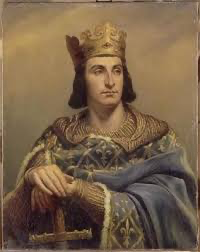The French King Philip IV
Part 2: French Supremacy
In 1307, Philip had members of the Knights Templar arrested, on Friday, the 13th of October. The Knights were tortured into giving false confessions of embracing sacrilege and of committing wicked and sinful acts. England's king, Edward II, followed suit, ordering the arrest of leaders of the order based there. The papacy, which had commissioned the Knights Templars in the first place, now turned on the order, ordering them arrested all over Europe. In 1310, Philip IV had 54 Templars burned at the stake. More executions followed, including the Grand Master, James of Molay, in 1314. In 1297, Pope Boniface VIII had canonized Philip's grandfather, Louis IX, making him the first (and, so far, only) French king to be named a saint. Despite this, Philip came into a great level of conflict with the pope. During the next several years, Philip established himself as a leader in anti-papal fervor and action, A royal scandal dominated court life in 1313. In the Tour de Nesle Affair, the wives of all three of Philip's sons faced accusations of improper behavior. The men involved were tortured and executed; the women involved were imprisoned for the rest of their lives. In his last days, Philip confronted a new uprising in Flanders and a new occupant of the papal throne, Clement V having died in April 1314. Philip died on Nov. 29, 1314, as a result of a stroke that he had suffered a few weeks before while on a hunt. His son Louis followed him on to the throne. Next page > Building Influence > Page 1, 2 |
|
Social Studies for Kids
copyright 2002–2026
David White



 In the next two years, with war debts piling up, Philip took two drastic steps against significant elements of his populace. The first came in 1306, when he confiscated the property of French Jews and then expelled them.
In the next two years, with war debts piling up, Philip took two drastic steps against significant elements of his populace. The first came in 1306, when he confiscated the property of French Jews and then expelled them. asserting that he had the right to tax clergy and at one point publicly burning a pronouncement from the pope himself. Largely as a result of mistreatment by Philip, Pope Boniface died in 1303, and the next pope was Clement V, who had as his base Avignon, in France. The new pope refused to move to Rome, and thus was begun the Avignon Papacy, sometimes referred to as the Babylonian Captivity of the Papacy, during which a succession of seven popes ruled not from Rome but from France.
asserting that he had the right to tax clergy and at one point publicly burning a pronouncement from the pope himself. Largely as a result of mistreatment by Philip, Pope Boniface died in 1303, and the next pope was Clement V, who had as his base Avignon, in France. The new pope refused to move to Rome, and thus was begun the Avignon Papacy, sometimes referred to as the Babylonian Captivity of the Papacy, during which a succession of seven popes ruled not from Rome but from France.
